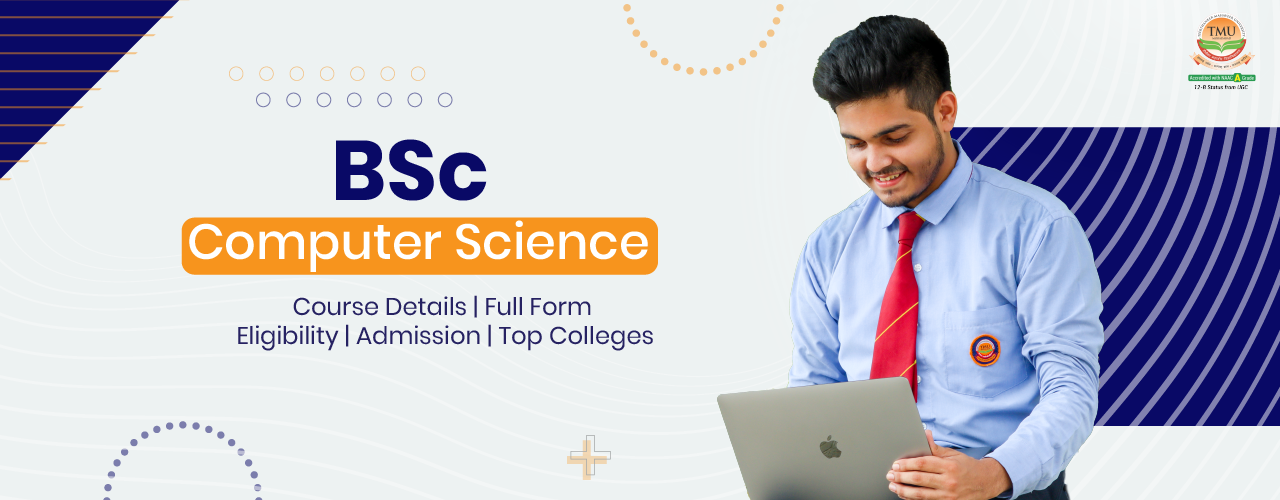BSc Computer Science Course Details, Full Form, Fees, Eligibility, Syllabus, Admission, Colleges
Table of Contents
BSc Computer Science is a 3-year undergraduate degree programme that provides comprehensive knowledge of computer science, programming, and technology. The curriculum of this course covers topics like database management, operating systems, networking, programming, and many more. The course provides both theoretical and practical knowledge of computing science.
The full form of BSc Computer Science is the Bachelor of Science in Computer Science. During this programme, the students learn how to design, develop, and manage software systems. It provides diverse career opportunities in various fields. BSc Computing Science graduates can find employment in both private and government sectors.
The duration of this course is 3 years, divided into 6 semesters. It contains theory, code, and practice, which gives learners an opportunity to explore computer architecture, all the way to artificial intelligence and machine learning. It also includes projects, internships, workshops, and coding competitions.
BSc Computer Science Course Overview
| Particulars | Details |
| Course Name | B.Sc. Computer Science |
| Level of Study | Undergraduate Degree Programme |
| Duration | 3 Years (6 Semesters) |
| Eligibility Criteria | 10+2 (Science stream) with Mathematics from a recognised board |
| Admission Process | Merit-based admission as per qualifying examination marks |
| Curriculum Focus | Programming, Data Structures, Algorithms, Database Management, Web Development, Artificial Intelligence, and Emerging Technologies |
| Career Fields | Software Development, Data Analysis, Cybersecurity, Cloud Computing, Web & App Development, Artificial Intelligence |
| Top Recruiters | Infosys, TCS, Wipro, IBM, HCL, Accenture, Tech Mahindra, Amazon |
| Higher Education Options | M.Sc. Computer Science, MCA, MBA (IT), Data Science, or AI/ML specialisations |
Teerthanker Mahaveer University
Apply for Admission
Click Here To Apply for Admission
BSc Computer Science Eligibility Criteria
If you are interested in studying BSc Computer Science, you are required to meet the following eligibility criteria:
- Educational Qualifications: You are required to complete the higher secondary qualification from a recognised board or college.
Marks: You must have secured at least 50-60% marks. - Stream: Only students from the science stream are eligible to apply.
- Age Limit: The maximum age limit to apply for the BSc Computer Science is 17 years.
- Subjects: Your core subjects should be Physics, Maths, Chemistry or Computer Science.
Subjects and Syllabus
Here’s a semester-wise breakdown of subjects and the syllabus of the BSc Computer Science:
| Semester | Core Subjects/Topics Covered |
| Semester 1 |
|
| Semester 2 |
|
| Semester 3 |
|
| Semester 4 |
|
| Semester 5 |
|
| Semester 6 |
|
Admission Process for BSc Computer Science
Here’s a step-by-step guide for the admission process to the BSc Computer Science. Let’s have a look:
Apply for admis
- Choose the college you want to apply to and submit your application.
- You can submit the application online through the official website or offline by approaching the admission center directly.
Entrance Exam or Merit
- To get admission, you have to qualify for the entrance examination.
- In other universities, students are admitted depending on their merit.
Interview & Final Admission
- Based on the exam or merit, shortlisted students will get a call for an interview session.
- After a successful interview, pay the admission fee to confirm your seat.
Career Opportunities after BSc Computer Science
| Job Role | Job Description | Average Salary Range (per annum) |
| Software Developer | Designs, codes, and tests software applications for various platforms and clients. | ₹4–₹8 LPA |
| Web Developer | Builds and maintains websites using front-end and back-end technologies. | ₹3–₹6 LPA |
| Data Analyst | Collects, processes, and interprets large data sets to help in decision-making. | ₹4–₹7 LPA |
| Database Administrator | Manages, secures, and optimises databases for smooth business operations. | ₹5–₹9 LPA |
| Network Administrator | Oversees network infrastructure and ensures connectivity and security. | ₹4–₹6 LPA |
| Cybersecurity Analyst | Protects systems and networks from cyber threats, malware, and data breaches. | ₹5–₹10 LPA |
| Cloud Engineer | Designs and manages cloud-based applications and services. | ₹6 – ₹12 LPA |
| AI/ML Engineer | Develops algorithms and models for automation, predictions, and intelligent systems. | ₹8–₹15 LPA |
| System Analyst | Analyses and improves IT systems to enhance business performance. | ₹5–₹9 LPA |
| IT Consultant | Provides expert advice on implementing and managing technology solutions. | ₹6 – ₹10 LPA |
| Full-Stack Developer | Handles both client-side and server-side software development. | ₹5 – ₹12 LPA |
| Mobile App Developer | Creates apps for Android and iOS platforms with modern frameworks. | ₹4–₹8 LPA |
Higher Studies Options
- Post-Graduation Course: After completing a BSc Computer Science, you have the option of pursuing a post-graduation course. Pursuing higher education will advance your skills and unlock better opportunities. These courses will provide in-depth knowledge of the programme and prepare graduates for technical and managerial positions.
- Certification Course: Many students choose to pursue certification courses after completing a BSc Computer Science. These programmes focus on providing practical training and industry-relevant technologies. After having certifications, graduates can get more job opportunities, higher earnings and growth opportunities.
- Specialisation Course: Specialisation courses provide deeper knowledge in a particular field. These courses equip you with a skill that offers you multiple career opportunities. It prepares you to build a strong professional reputation. Specialisation courses allow you to focus on a specific area so that you can gain deeper knowledge and problem-solving skills.
Top Colleges for BSc Computer Science
| College / University | Location |
| Loyola College | Chennai, Tamil Nadu |
| Christ University | Bengaluru, Karnataka |
| Teerthanker Mahaveer University (TMU) | Moradabad, Uttar Pradesh |
| St. Xavier’s College | Mumbai, Maharashtra |
| Fergusson College | Pune, Maharashtra |
Get Excellence in Computing Science Education at TMU
Pursuing a BSc Computer Science at Teerthankar Mahaveer University offers you an exceptional blend of academic excellence and practical learning. The College of Computing Science and IT at TMU provides students with in-depth knowledge of computer systems and technologies. The curriculum of TMU includes practical training, live projects, and workshops that prepare students to meet real-world industry challenges with confidence.
BSc Computer Science Specialisations at TMU
| Specialisation | Focus Area |
| Artificial Intelligence & Data Science | Machine learning, data analytics, and predictive systems |
| Blockchain Technologies | Decentralised systems and smart contracts |
| Data Engineering | Data pipelines and database management |
| Full-Stack Development | Front-end and back-end web development |
| Cloud Technology & IoT | Cloud computing and connected devices |
| Information Security | Cybersecurity and ethical hacking |
| Cognitive Science | AI, psychology, and human–computer interaction |
Admission process at TMU
Meet Eligibility Criteria
- To get admission to a BSc Computer Science at TMU, you are required to pass 10+2 in the science stream.
- You must achieve a minimum of 60% marks.
Admission Process
- You can apply online for the BSc Computer Science through the official admission page of TMU.
- Finish the application form and fill out the information.
- Upload required documents
- After successfully applying, the TMU Admission Cell will coordinate with you for the further process.
- Pay the admission fee and confirm your seat
Conclusion
Pursuing a BSc Computer Science will provide you with a lot of opportunities in diverse fields. With the increasing need for Computer Science professionals, the field opens vast job opportunities for graduates. This programme provides you with the foundation to start your own business in the IT industry. It will also help you to develop strong analytical and problem-solving skills.
FAQ
Q1. What is BSc Computer Science?
Ans. BSc Computer Science is a 3-year undergraduate degree programme that provides a strong foundation in computer science and software development.
Q2. What is the scope of BSc Computer Science?
Ans. BSc Computer Science has a broad scope. Graduates can get a job in diverse areas like software development, data science, AI, cybersecurity and many more.
Q3. Is BSc CS better than BTech?
Ans. Both degrees are better and have diverse career opportunities. If you are interested in science and the research industry, you can choose a BSc; if you are passionate about a practical, engineering-focused path, you can choose a B.Tech.
Q4. Which BSc has a high salary?
Ans. A BSc course in Data Science, IT, and AI generally offers a higher salary. Graduates from this field can earn an average starting salary between ₹6-10 LPA or higher.















